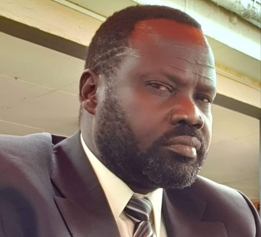A former member of the Transitional National Legislative Assembly (TNLA) representing Nasir County and a member of the Pan-African Parliament who resigned both roles on 11 June and launched a rebel movement said in an Independence Day anniversary message today that the current political quagmire is not what people died for during the liberation struggle.
Dei Tut Weang Khor, the Chairman of the South Sudan People’s Liberation Movement (SSPLM), resigned as a lawmaker, citing several reasons like the SSPDF and Ugandan Air Force bombing civilians in his constituency, and political repression and arbitrary arrests of opposition politicians, among others. He urged all South Sudanese youths to join together and remove the dictatorship of President Salva Kiir and his corrupt regime.
“This is not the future our brothers and sisters died for. This is not the freedom we marched toward. And yet, I say this not to shame us, but to shake us. Because the story of our nation is not finished. Because pain does not cancel purpose. Because even now, a new chapter can rise,” Tut said in his Independence Day anniversary speech. “My brothers and sisters, true independence is not just the removal of chains. It is the building of peace. It is justice that protects every citizen, not just the powerful. It is a government that serves, not rules. It is schools, not silence. Jobs, not guns. Dialogue, not division.”
Find below the full speech:
Speech of the chairman of the South Sudan People’s Liberation Movement (SSPLM) on the 14th anniversary of Independence of South Sudan, 9 July 2011
My fellow citizens,
Today, we gather to commemorate July 9th, 2011, the day our nation first breathed the air of independence, a day that once pulsed with hope, pride, and an unshakable belief in a future of freedom, dignity, and opportunity for all.
On that historic day, flags rose, fists clenched in celebration, and songs of liberation echoed across our lands. We became a people no longer bound by foreign chains, a people who could finally shape our destiny.
But today, on this fourteenth anniversary, as we stand in the shadow of that great promise, we must ask ourselves, what have we done with our freedom?
The First Sudanese Civil War was a brutal conflict between Sudan and South Sudan, rooted in deep political, cultural, and religious divisions. It lasted for 17 years, from 1955 to 1972, beginning even before Sudan officially gained independence from British-Egyptian rule in 1956. The war claimed the lives of an estimated 500,000 people and devastated communities across the South. Yet this devastation sprang a rebellion and a powerful liberation movement, one that sparked the long and painful struggle for South Sudanese liberation, ultimately granting the nation its sovereignty.
But we cannot hide from the truth. In the years since independence, we have been torn apart not by outside forces, but by our own hands. Civil war has carved deep scars into the body of our nation. Our children have known the sound of bombs more than the sound of school bells. Our people have buried dreams alongside the bodies of loved ones. The promise of progress has been replaced by the reality of stagnation. And the hope of unity has drowned in waves of division.
The Sudan People’s Liberation Movement (SPLM) was founded in 1983, marking the beginning of the Second Sudanese Civil War, a brutal conflict that lasted over two decades and claimed the lives of an estimated two million people. Though the SPLM began as a liberation movement fighting against the North, internal disputes eventually led to division in the group, concerning Dr. John Garang and General Gai Tut in Itang, Ethiopia, forming the South Sudan Liberation Movement (SSLM) otherwise known as Anyanya (2). Tragically, since our freedom, South Sudan has experienced its own war, this time not against an external oppressor, but from within.
The SPLM, a movement that once fought for our liberation, now claims the lives of South Sudanese people, committing violence against its civilians, bombardments with other countries’ machinery, atrocities, mass displacement, hunger, and famine. The economy has collapsed. Infrastructure is nearly nonexistent, with no roads, no food, and no safe refuge.
Dreams of liberation are now nightmares.
This is not the future our brothers and sisters died for.
This is not the freedom we marched toward.
And yet, I say this not to shame us, but to shake us.
Because the story of our nation is not finished.
Because pain does not cancel purpose.
Because even now, a new chapter can rise.
My brothers and sisters, true independence is not just the removal of chains. It is the building of peace. It is justice that protects every citizen, not just the powerful. It is a government that serves, not rules. It is schools, not silence. Jobs, not guns. Dialogue, not division.
We are not fated to repeat the violence of yesterday. We are not sentenced to live forever in the aftermath of broken politics and broken promises. We are the authors of tomorrow, and we must write it together.
Let this day not only be a memorial of the past but a mandate for the future. Let this generation be the one that says: enough blood, enough loss, enough lies. Let us rebuild what was broken. Let us reach for the dream our brothers and sisters died for. Let us enjoin the freedom, not just a flag or a phrase.
So today, we do not celebrate blindly.
We remember.
We grieve.
We reflect.
And then, we rise.
Happy Independence Day, not just a day of the past.
Dei Tut Weangkhor
Chairman of the South Sudan People’s Liberation Movement.




